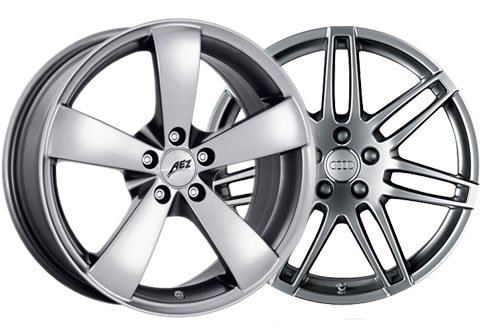
For many car owners, the wheels on their vehicles make a statement. But besides appearance, they also play an essential role in your safety. The wheels are the only link between the car and road surface. Hence, choosing the right wheel for your four-wheeler is essential. It comes down to selecting between steel and alloy wheels, as they are the most common ones used in automobiles. There are other variants like carbon fibre, but they are costly and rare.
Each compound has its benefits and drawbacks. Basic cars come with steel wheels as it’s a go-to material for most vehicle components. Steel is cheap and can be easily moulded into several shapes to match the driving demands. But many cars these days are getting fitted with alloy wheels. These wheels are lighter and improve the overall appearance and car’s performance.
So, in this blog, we’ll help you compare the advantages and disadvantages, from price to performance of each wheel type.
Alloy Wheels –
Alloy is a mixture of various metals, combining their unique qualities (hardness, rigidity, malleability). So, the alloy wheel incorporates an alloy of light metals, either magnesium, nickel, aluminium, or a combination of these. These wheels offer performance advantages over steel ones, as they are often some pounds lighter – reduced weight refers to faster braking and quicker acceleration. In extreme road and weather conditions, these wheels are better able to resist heat than their steel counterparts.
Pros of Alloy Wheels
Aesthetics – The best advantage of alloy wheels is their visual appearance. In many vehicles, these tyres are a luxury feature. These cars are premium variants.
Performance- The lightweight structure of alloy wheels allow them to transmit less weight to the coil spring, providing optimal grip and traction.
Weight – Alloy wheels are relatively lighter in weight, ensuring better fuel efficiency, acceleration and braking.
Rust Proof – Another benefit of alloy wheels is they’re corrosion-proof. This feature is handy for people in the coastal areas where surface and salt corrosion is recurrent.
Cons of Alloy Wheels
Rigidity – Unfortunately, alloy wheels are not stronger than steel. These units are prone to dents, cracks and curb rashes. And due to this, even the slightest damage to the wheels can ruin the overall car’s appearance.
Price – These wheels are costly to buy, repair and manufacture because of their elaborate production process.
Repairability – Repairing the alloy wheels is very expensive.
Steel Wheels –
As the name suggests, steel wheels contain steel, precisely “stamped steel”. These units have existed for a long time and ensure toughness and longevity. There are steel wheels on SUVs, city vehicles and even in HMVs. They are a cost-effective alternative to their alloy counterparts.
Pros of Steel Wheels –
Durability – Owing to their construction, these wheels are firmer than alloy wheels. It’s why vehicle manufacturers install tough, rugged SUVs (Sports Utility Vehicles) with steel units. These units are also the first choice of several economy vehicle manufacturers.
Price – The manufacturing process for steel wheels comprises barging the wheel until it gets the desired shape. These units are much cheaper to purchase, costing less than 70-80% of the price of alloy wheels.
Repairability – These wheels are more malleable than their alloy counterparts, making them easier to repair. To repair a steel unit, you require a hammer to bend the portion into proper shape.
Cons of Steel Wheels
Weight – Regardless of the benefits, these wheels are heavier, adding to the overall car’s weight. With increased weight, the vehicle suspension takes a beating after some time.
Looks – Steel wheels are not the most favourite choice of luxury carmakers. They don’t look very appealing.
Corrosion – These wheels are more prone to get rust. Although, with modern solutions like power coating, steel wheels can resist corrosion up to a point.
If your car wheels require repairs or replacement, drive down to our workshop. At Tyre Fit Auto, we provide the best-in-class Alloy Wheel Repair Leamington Spa at competitive prices.
Also Read – Benefits of A Mobile Tyre Fitting Service